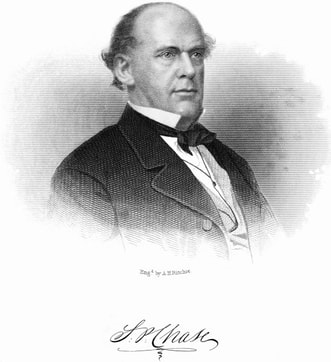 The Semi-Colon Club was a regular informal gathering of Cincinnati writers and literary enthusiasts including Lyman, Catherine, and Harriet Beecher, Eliza and Calvin Stowe, Dr. Daniel Drake, and Elizabeth Blackwell. Among its other notables was Salmon P. Chase who became Lincoln’s Secretary of Treasury and future Chief Justice of the U.S. Supreme Court. Salmon Portland Chase was born in 1808 in Cornish, New Hampshire. Chase lived from 1820 to 1824 in Ohio with his uncle, Bishop Philander Chase, a leading figure in the Protestant Episcopal Church in the West. He was graduated from Dartmouth College Law School in 1826 and established a prominent legal practice in Cincinnati, where he is remembered as an advocate for escaped slaves. He defended many escapees in court charged under the Fugitive Slave Law of 1793 as well as other that aided and abetted their getaway. Chase was later dubbed the "Attorney General for Fugitive Slaves”. In 1847 he argued on behalf of John Van Zandt before the U.S. Supreme Court. The case challenged the constitutionality of the fugitive slave laws. Van Zandt served as a “conductor” in the Underground Railroad in Evendale, Ohio. Van Zandt was sued by a slaveholder and was party to Jones v. Van Zandt. Chase contended that when an enslaved person leaves the jurisdiction of a state where slavery is legal, he ceases to be a slave. In this, and similar cases, the court ruled against against Van Zandt, upholding the right and obligation of government to protect slavery. Van Zandt was financially and emotionally ruined by the decision and died later that year. It is widely held that Van Zandt was the basis for the character of Van Trompe in Harriet Beecher Stowe's Uncle Tom's Cabin. Chase left the Whig Party in 1841 to lead Ohio's Liberty Party. In 1848 he helped establish the Free Soil Party and won election to the U.S. Senate a year later. He opposed the Compromise of 1850 and the Kansas–Nebraska Act, and helped establish the Republican Party. After leaving the Senate, Chase served as the Governor of Ohio from 1856 to 1860. In 1860 Chase sought the Republican presidential nomination but lost the party’s candidacy to Abraham Lincoln. He served as Lincoln’s Secretary of Treasury from 1861 to 1864 tasked with ensuring that the Union was well-financed during the Civil War. He is credited with changing the phrase on U.S. currency from ”In God is our Trust,"to "In God We Trust". He resigned from the Cabinet to fill the Supreme Court vacancy following Chief Justice Roger Taney's death. Chase served as Chief Justice from 1864 to his death in 1873. He presided over the Senate trial of President Andrew Johnson during the impeachment proceedings of 1868. Despite his nomination to the court, Chase continued to pursue the presidency. He unsuccessfully sought the Democratic presidential nomination in 1868 and the Liberal Republican nomination in 1872. Chase died of a stroke in New York City on May 7, 1873. He was first interred in Oak Hill Cemetery in Washington, D.C., and re-interred in October 1886 in Spring Grove Cemetery in Cincinnati. His birthplace in New Hampshire was declared a National Historic Landmark in 1975. A portrait of Chase appeared on the United States $10,000 bill, the largest denomination of U.S. currency to publicly circulate. The bill was last printed in 1945. References 1) https://ohiohistorycentral.org/w/Salmon_P._Chase 2) 2) https://en.wikipedia.org/wiki/Salmon_P._Chase 3) ”New York Times". 15 November 1852. Some Account of Mrs Beecher Stowe and Her Family, by an Alabama Man About the author: Dr. Nicholas Andreadis is a volunteer at the Harriet Beecher Stowe House. He was a professor and dean at Western Michigan University prior to moving to Cincinnati.
3 Comments
3/21/2025 02:49:56 pm
Your blog on Attorney General to Fugitive Slaves sheds light on a critical historical issue. The legal stance and its impact are thought-provoking. I appreciate the depth of your analysis!
Reply
Leave a Reply. |
Archives
March 2025
Categories
All
|
|

 RSS Feed
RSS Feed